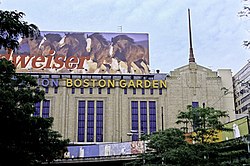"The Garden" | |
 Boston Garden viewed from Causeway Street 1994 | |
 | |
| Former names | Boston Madison Square Garden |
|---|---|
| Address | 150 Causeway Street |
| Location | Boston, Massachusetts |
| Coordinates | 42°21′57″N 71°3′42″W / 42.36583°N 71.06167°W |
| Owner | Boston and Maine Corporation (1928–1965)[1] Linnell & Cox (1965[1]–1973[2]) Storer Broadcasting (1973–1975)[2] Delaware North (1975–1997)[2] |
| Operator | Madison Square Garden Corporation (1928–1934) Boston Garden-Arena Corporation (1934–1973)[3] Storer Broadcasting (1973–1975) Delaware North (1975–1997) |
| Capacity | Ice hockey: 14,448[7] Basketball: 14,890[7] Concerts: 15,909[7] |
| Surface | Ice / Parquet floor |
| Construction | |
| Broke ground | December 1927 |
| Opened | November 17, 1928 |
| Closed | September 28, 1995 |
| Demolished | March 1998 – September 1998 |
| Construction cost | $4 million[4] ($71 million in 2023 dollars[5]) |
| Architect | Tex Rickard Funk & Wilcox Company[6] |
| General contractor | Dwight P. Robinson Company, Inc. |
| Tenants | |
| Boston Bruins (NHL) (1928–1995) Boston Celtics (BAA/NBA) (1946–1995) Boston Braves (AHL) (1971–1974) New England Whalers (WHA) (1973–1974) Boston Blazers (MILL) (1992–1995) | |
The Boston Garden was an arena in Boston, Massachusetts. Designed by boxing promoter Tex Rickard, who also built the third iteration of New York's Madison Square Garden, it opened on November 17, 1928, as "Boston Madison Square Garden" (later shortened to just "Boston Garden") and outlived its original namesake by 30 years. It was above North Station, a train station which was originally a hub for the Boston and Maine Railroad and is now a hub for MBTA Commuter Rail and Amtrak trains.
The Garden hosted home games for the Boston Bruins of the National Hockey League (NHL) and the Boston Celtics of the National Basketball Association (NBA), as well as rock concerts, amateur sports, boxing and professional wrestling matches, circuses, and ice shows. It was also used as an exposition hall for political rallies such as the speech by John F. Kennedy in November 1960. Boston Garden was demolished in 1998, three years after the completion of its successor arena, TD Garden.
- ^ a b "Two Years of Dickering Come to an End". The Boston Globe. January 1, 1966.
- ^ a b c "Bruins, Boston Garden Sold". Evening Independent. St. Petersburg, Florida. Associated Press. August 28, 1975. Retrieved March 19, 2012.
- ^ United Press International (December 8, 1972). "Broadcasting Firm Merges with Ownership of Bruins". Montreal Gazette. Retrieved March 19, 2012.
- ^ "The Boston Garden". ballparks.com.
- ^ 1634–1699: McCusker, J. J. (1997). How Much Is That in Real Money? A Historical Price Index for Use as a Deflator of Money Values in the Economy of the United States: Addenda et Corrigenda (PDF). American Antiquarian Society. 1700–1799: McCusker, J. J. (1992). How Much Is That in Real Money? A Historical Price Index for Use as a Deflator of Money Values in the Economy of the United States (PDF). American Antiquarian Society. 1800–present: Federal Reserve Bank of Minneapolis. "Consumer Price Index (estimate) 1800–". Retrieved February 29, 2024.
- ^ "New Boston Garden Development, Draft Environmental Impact Report". New Boston Garden Corporation. October 1, 1990. Retrieved May 6, 2014.
- ^ a b c McDonough, Will (May 6, 1992). "Financing is Closer for a New Garden Moulter Says Deal May Be Days Away". The Boston Globe. Archived from the original on April 11, 2013. Retrieved February 25, 2013.